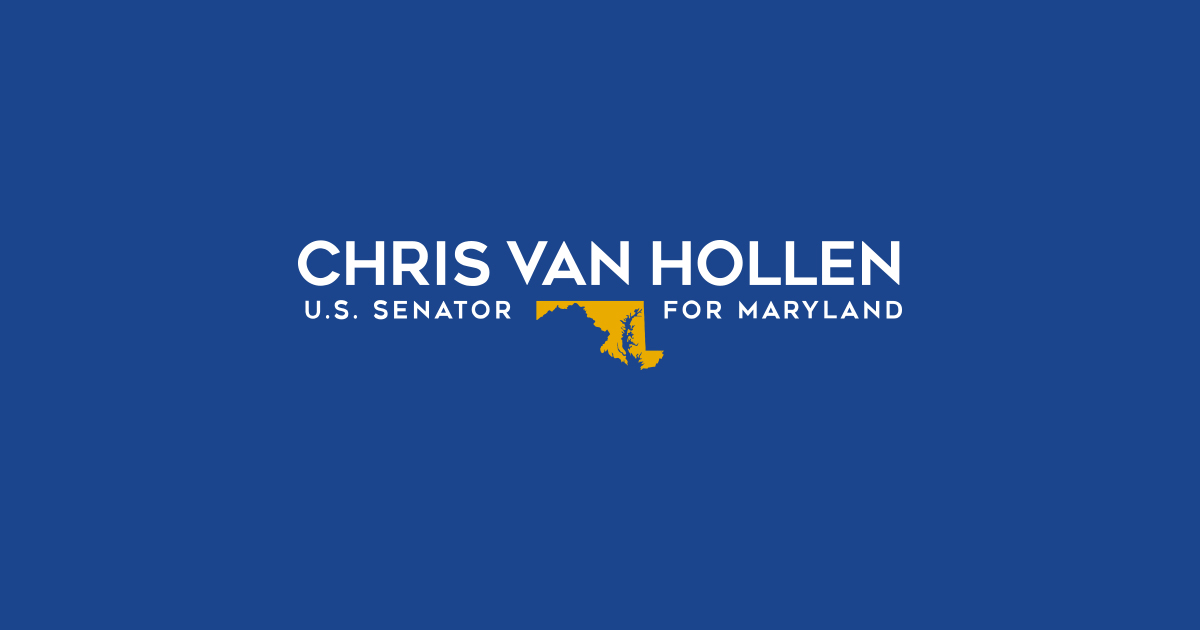Source: United States Senator for Maryland Chris Van Hollen
March 28, 2022
In a series of letters, Senator Van Hollen urged the country’s largest banks to lower or eliminate overdraft fees
U.S. Senators Chris Van Hollen (D-Md.) and Reverend Raphael Warnock (D-Ga.) joined Senator Sherrod Brown (D-Ohio) in sending letters to major banks urging them to lower or fully eliminate their overdraft fees. The letters were sent to the Chief Executive Officers of Charles Schwab, JPMorgan Chase, PNC Financial Services Group, TD Group, Truist Financial Corporation, U.S. Bancorp, and Wells Fargo.
“Financial institutions should do all they can to ensure working families keep their hard-earned money by significantly reforming their overdraft practices…” wrote the Senators in today’s letter. “These fees not only drain bank accounts, but also push consumers out of the banking system and into the arms of unscrupulous and unsupervised lenders who are all too willing to overcharge them for similar services. The result is that millions of Americans are underbanked or unbanked.”
Senator Chris Van Hollen is focused on stopping big corporations from using anti-consumer tactics to boost their profits at the expense of hard-working families in Maryland and across the country. Last year, at a Senate Banking, Housing, & Urban Affairs Committee hearing, the Senator pressed financial regulators to require U.S. banks to get rid of excessive overdraft fees, with some banks – like Citi and Capitol One – heeding his call following the hearing. The Senator has also worked to cap the cost of insulin, seek justice for students cheated by Navient, and protect consumers by banning forced arbitration.
The letter, led by Senator Brown, was also signed by Senators Cory Booker (D-N.J.) and Jack Reed (D-R.I.).
Read a sample letter below:
We are encouraged by recent announcements from several financial institutions regarding changes to their overdraft policies. We applaud the actions taken by Capital One and Citi to eliminate overdraft fees, as well as Bank of America’s decision to substantially reduce these fees. We urge [bank] to quickly follow their lead, and to also completely eliminate nonsufficient fund (NSF) fees, as Capital One, Citi, Wells Fargo and Bank of America have done. Financial institutions should do all they can to ensure working families keep their hard-earned money by significantly reforming their overdraft practices.
Overdraft and NSF fees are overwhelmingly borne by those Americans already living paycheck to paycheck. The Consumer Financial Protection Bureau (CFPB) found that nearly 80% of overdraft-related fees are charged to only 9% of accounts, who tend to carry low balances— averaging less than $350—and have relatively low monthly deposits. All told, the average consumer with overdraft coverage pays $260 in overdraft and NSF fees each year.
These fees not only drain bank accounts, but also push consumers out of the banking system and into the arms of unscrupulous and unsupervised lenders who are all too willing to overcharge them for similar services. The result is that millions of Americans are underbanked or unbanked. According to the Federal Deposit Insurance Corporation (FDIC)’s latest Survey of Household Use of Banking and Financial Services, half of unbanked households previously had a bank account. Of those unbanked households, 37.8% pointed to high or unpredictable fees or not having enough money to meet minimum balance requirements as the main reasons they no longer have a bank account. Overdraft fees harm many consumers so much that they either voluntarily opt out of the banking system or are driven out altogether by account closures.
Indeed, the CFPB has found that those who opt in to overdraft fees are more likely to have their accounts involuntarily closed than those who do not. Ultimately, by charging overdraft fees, financial institutions are undermining consumers’ confidence in the banking system they need consumers to participate in.
We are hopeful that recent industry fee changes—which include eliminating NSF fees, providing a $50 or $100 cushion before charging an overdraft fee, providing a 24-hour grace period, and charging only one fee per day—mark the beginning of a shift towards a fairer and more transparent fee structure.
We write to urge [bank] to significantly reduce overdraft fees or eliminate them altogether. Additionally, we respectfully request [bank] to respond by April 7, 2022, detailing its plans to significantly reduce or eliminate overdraft fees.
###
